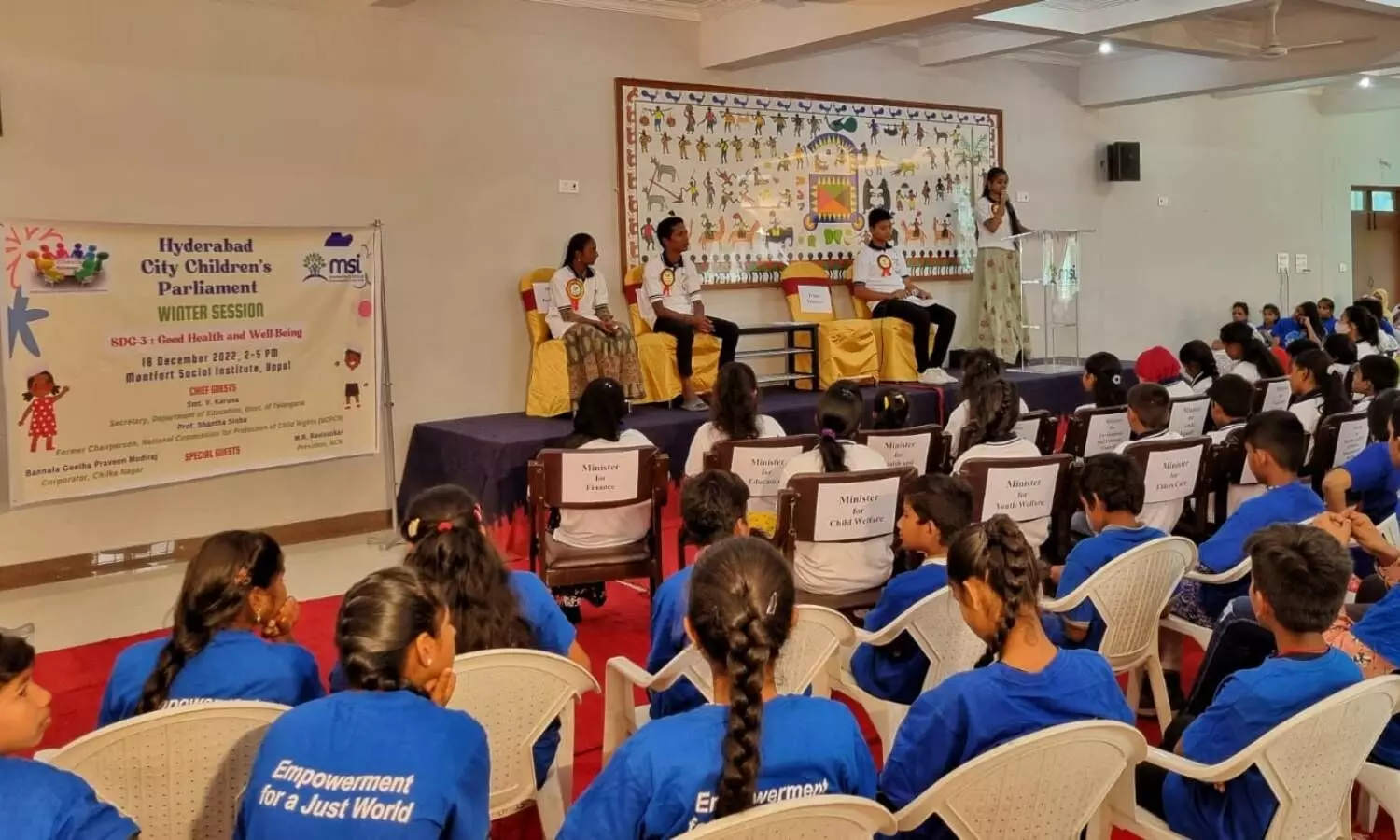Children's parliament: How Hyderabad slum kids held a session to discuss pressing issues
Children from 30 slums in Hyderabad took part in the programme held in Uppal on Sunday. The theme for this winter session of the children's parliament is SDG3- Good Health and Well-Being.
By Nimisha S Pradeep
Hyderabad: On Sunday afternoon, around 50 kids sat in a horseshoe setup to hold a Children parliament and discuss water scarcity, poor medical care, and drug abuse in the city
Unlike children who would be playing or watching their favorite TV programme, these children gathered to discuss their day-to-day problems.
"Our living conditions are very poor, making us vulnerable to various diseases. And when it comes to treatment, local private hospitals are way expensive. The existing Bastis and Dawa khana are not enough," said Ananya, who acted as Minister for Water at the Hyderabad City Children's Parliament.
Children from 30 slums in Hyderabad took part in the programme held in Uppal on Sunday. The theme for this winter session of the children's parliament is SDG3- Good Health and Well-Being.
At the Hyderabad city-level parliament, children discussed various issues that they face daily in their slums and tried to suggest solutions for the same.
Jayalakshmi, who acted as former Prime Minister said that the programme made her more confident to come out and speak about her issues. She also added that it's not just about discussing but also preparing some resolutions and handing them over to the authorities for execution.
. "Last year, in the city-level parliament, we took zero hunger as our challenge. We found out that there were no anganwadis in 21 slums. So bringing anganwadis into these slums was one of our resolutions. Also, we started a pilot project, breakfast for 56 slums in Hyderabad. Both projects have been approved and the execution is in the pipeline," explained Jayalakshmi, who lives in Singareni colony slums.
Jayalakshmi said, "I have never had the luxury of having breakfast every day. My parents are rag pickers and they go to work at 4 am. So they never got the time to look after us."
Jayalakshmi, who is now doing her intermediate at St.Francis college is currently working at the international level of the children's parliament.
"As a member of the world parliament, representatives from nine countries come together on online mode and discuss various issues in our respective communities," she said
There are children parliaments at the slum, district, state, national, and international levels.
Jayashri, another participant of the city-level children's parliament, said how the programme helped her to know about the various issues in society and enabled her to work towards finding solutions to them.
Prof. Shantha Sinha, former chairperson of the National Commission for Protection of Child Rights (NCPCR), who was a chief guest at the programme said that such initiatives are very important.
"The slum children's voices are very important, they are to be heard by the authorities. They are not academic discourses but these children shared their daily reality," said Prof. Sinha.
She said that the children shared their ideas and perspectives on doable solutions which can be useful for the government.
Prof. Sinha also talked about the apathy that the government shows towards this community. "It is a pity that the voices of these children are not being heard by the government. Nothing is happening to them (their issues). Where is the government's presence in these children?" asked Prof.Sinha.
Brother Varghese, founder of Montfort Social Institute who organized the parliament said, "Democracy and human rights are great civilizational values of our times. They need to be sustained and promoted so that everyone can enjoy them. Children's parliament in slums and among those who are deprived is a way to empower people. We have over 2,00,000 Children's parliaments all over the country today. We are seeing great results. A new kind of democratic and value-based leadership is emerging among the young through them. In the process, governance is being reshaped in communities and neighborhoods."